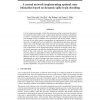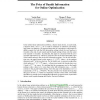129
Voted
NIPS
2007
15 years 4 months ago
2007
It is becoming increasingly evident that organisms acting in uncertain dynamical environments often employ exact or approximate Bayesian statistical calculations in order to conti...
117
Voted
NIPS
2007
15 years 4 months ago
2007
Markov jump processes play an important role in a large number of application domains. However, realistic systems are analytically intractable and they have traditionally been ana...
88
Voted
NIPS
2007
15 years 4 months ago
2007
Extensive games are a powerful model of multiagent decision-making scenarios with incomplete information. Finding a Nash equilibrium for very large instances of these games has re...
125
Voted
NIPS
2007
15 years 4 months ago
2007
We extend the Bayesian skill rating system TrueSkill to infer entire time series of skills of players by smoothing through time instead of filtering. The skill of each participat...
131
Voted
NIPS
2007
15 years 4 months ago
2007
We investigate the problem of learning a widely-used latent-variable model – the Latent Dirichlet Allocation (LDA) or “topic” model – using distributed computation, where ...
107
Voted
NIPS
2007
15 years 4 months ago
2007
Can we leverage learning techniques to build a fast nearest-neighbor (ANN) retrieval data structure? We present a general learning framework for the NN problem in which sample que...
120
Voted
NIPS
2007
15 years 4 months ago
2007
Guided by the goal of obtaining an optimization algorithm that is both fast and yields good generalization, we study the descent direction maximizing the decrease in generalizatio...
114
Voted
NIPS
2007
15 years 4 months ago
2007
In the online linear optimization problem, a learner must choose, in each round, a decision from a set D ⊂ Rn in order to minimize an (unknown and changing) linear cost function...
142
Voted
NIPS
2007
15 years 4 months ago
2007
Empirical risk minimization offers well-known learning guarantees when training and test data come from the same domain. In the real world, though, we often wish to adapt a classi...
73
Voted
NIPS
2007
15 years 4 months ago
2007



